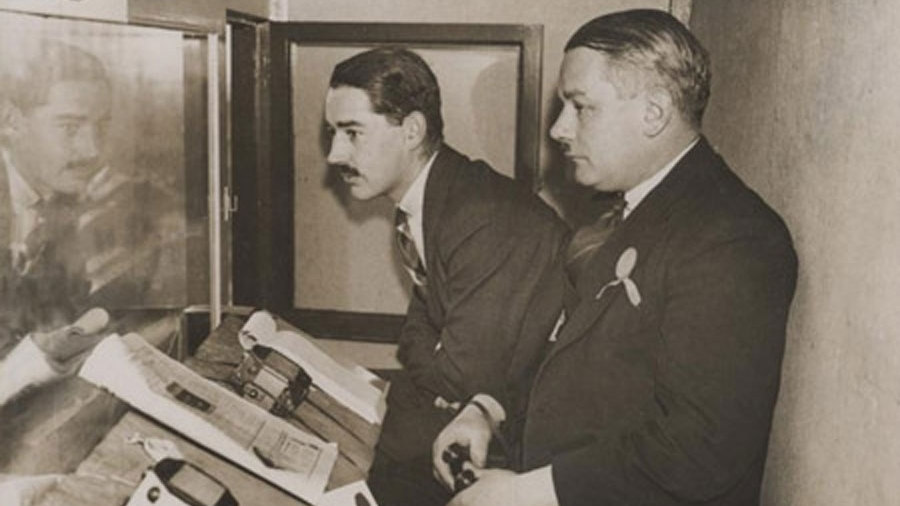January 15 down the years
Wheel and Duggan see red, Wakeham's co-commentator sees nothing
Teddy Wakelam (right) sitting beside John Snagge in the Twickenham press box © Getty Images
1977
Scottish referee Norman Sanson sent off Wales's Geoff Wheel and Ireland's Willie Duggan for fighting during Wales' 25-9 Five Nations victory in Cardiff. It was the first time that anyone had been dismissed in a Championship match, but Wales fared the better with 14 men as tries from JPR Williams, Gerald Davies and Clive Burgess secured victory. "I didn't know what that was about," Wheel told The Independent. "I wasn't involved with Willie Duggan at all. I didn't even see what he was supposed to have done. We even had a bit of a laugh about it on the sideline. We definitely got the best of it. He was having a really good game at the back of the line-out. Willie was a great character and an exceptionally good player. I don't know what he got sent off for but they ended up losing their best player and we won the game easily enough."
1910
In the first international staged at Twickenham, England beat Wales (11-6) for the first time for 12 years. Wing Fred Chapman scored a try as well as booting and conversion and penalty to help his side to victory. "The first international was largely regarded as a great success," noted the RFU Museum. "Special trains and trams helped 18,000 people to attend. The game itself got off to a sensational start when Chapman scored inside a minute. A further try from Solomon helped England win. There were a few gripes, including traffic congestion around Twickenham, but 'Billy Williams' Cabbage Patch' had got off to a flying start."
1927
The first live sports broadcast on the BBC came when the international England v Wales was commented on by Teddy Wakelam, a former Harlequin. He was sat next to a blind man from St Dunstans and told to act as if he was talking just to him. A week later he undertook the first football commentary on British radio, Arsenal - Sheffield United at Highbury. Later in 1927 he also covered cricket and Wimbledon and in 1938 he was the commentator for the first televised match, the Calcutta Cup clash also at Twickenham.
2008
Llanelli Scarlets confirmed scrum-half Dwayne Peel would join Guinness Premiership club Sale Sharks at the end of the season. His departure followed hot on the heels of an announcement by new Wales coach Warren Gatland that player plying their trade outside Wales would struggle to feature for the national side. Peel was excluded from this rule given the advanced nature of his negotiations with Sale
1972
A salutary lesson for those who hanker for the good old days of amateurism came from Peter Dixon. On the day he won the second of his 22 England caps in the 12-3 loss to Wales, he revealed he was living on £6.50 a week dole money as he was unemployed and had so little cash he was forced to miss some meals. Dixon, who had won three Lions caps the previous summer as well as playing in four Varsity matches, had finished a degree and was "writing a 70,000-word thesis on South-West African Mortuary Rites". "I am well versed in the politics and social structures of primitive races but that doesn't exactly qualify one for many jobs," he admitted. He later worked in overseas development at Durham University.
1949
Having worn lettered jerseys since the start of the 1930s, Wales reverted to numbered shirts again and donned white shorts for the first time for their 9-3 season opener against England at Cardiff.
1972
Barry John was whisked away by television presenter Eamonn Andrews for a recording of This is your Life after helping Wales to a hard-earned 12-3 victory against England at Twickenham. John played only two more Tests before announcing his early retirement form the game.
1938
Cliff Jones spearheaded Wales to a 14-8 win against England in a howling gale at Cardiff in the 50th match of the series.
1983
Ireland opened their successful Five Nations season as the first visitors to play in front of Murrayfield's new £3m East Stand. An Ollie Campbell conversion was the difference between the sides at the end, with Ireland beating Scotland 15-13.
© Scrum.com


